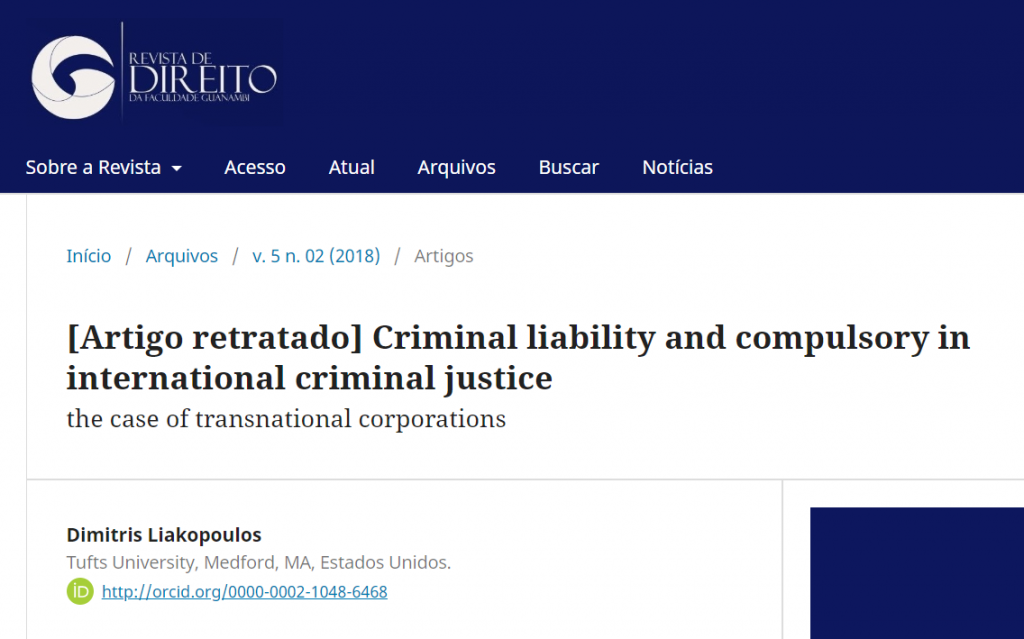
A legal scholar with a peripatetic and checkered career — and questionable CV — now has 23 retractions by our count.
Dimitris Liakopoulos, about whom we first wrote in July, has claimed to have held professorships in Europe and the United States, including at Columbia Law School, Stetson University and Tufts University, as well as authorship on some 600 papers. But journals have been retracting his articles over concerns about plagiarism and concerns about his stated academic affiliations. For example, Tufts told us in July that he had never been affiliated with the school.
Liakopoulos appears to have locked his ORCID ID, making public scrutiny of his scholarly output more difficult. But commenters on PubPeer have taken aim at several of his papers over the past few months.
Until recently, Liakopoulos had 10 retractions to his name. His tally now includes 13 new papers and two articles that journals have flagged with official notices after initially removing them without indicating why. The new retractions include papers from Revista de Faculdade de Direito do Sul de Minas, Lex et Scientia International Journal, and Revista Themis.
Here’s the retraction for “LEGAL BASIS AND “TRASVERSAL” INTERPRETATION OF THE ULTIMATE REFORMS OF THE EUROPEAN UNION JURISDICTIONAL SYSTEM” from Revista Themis:
The Editorial Board informs you that, following an intimation sent to the journal by Mrs. Chiara Amalfitano, professor of European Union Law at the University of Milan, the Ethics Commission of the University “Nicolae Titulescu” established that the study “Legal basis and ‘transversal’ interpretation of the ultimate reforms of the European Union jurisdictional system”, published by Mr. Dimitris Liakopoulos in LESIJ no. 2/2018, presents substantial takeovers from the study “La recente proposta di riforma dello Statuto della Corte di giustizia dell’Unione europea: molti dubbi e alcuni possibili emendamenti”, published in Italian by the author of the intimation in the journal Federalismi, September 2018. Also the Ethics Commission established that the author claimed, Mr Dimitris Liakopoulos, had published the study under false academic affiliation. In this context, the Ethics Commission recommended withdrawing the study mentioned in the contents of LESIJ Journal no. 2/2018, recommendation to which the editorial board acquiesced. At the same time, the decision to withdraw the study in question was communicated to the databases in which LESIJ is indexed. On this occasion, we express once again our firm commitment to the values of correctness and strict observance of the deontology of scientific research.
We’re not averse to a little horn tooting in this case. One source, who asked to remain anonymous, told us:
Your earlier blog has really helped: editors seemed to be afraid of all kinds of imaginary dangers, but with a published piece that shows they are not alone in being affected has perhaps given some of them more courage.
Like Retraction Watch? You can make a tax-deductible contribution to support our work, follow us on Twitter, like us on Facebook, add us to your RSS reader, or subscribe to our daily digest. If you find a retraction that’s not in our database, you can let us know here. For comments or feedback, email us at [email protected].
“Liakopoulos appears to have locked his ORCID ID, making public scrutiny of his scholarly output more difficult.”
And once you put your information on the internet it can be difficult to actually take it back or attempt to hide it.
Here is Liakopoulos’ ORCID page from May 2020 as archived by the Waybackmachine at the Internet Archive.
https://web.archive.org/web/20200507214856/https://orcid.org/0000-0002-1048-6468